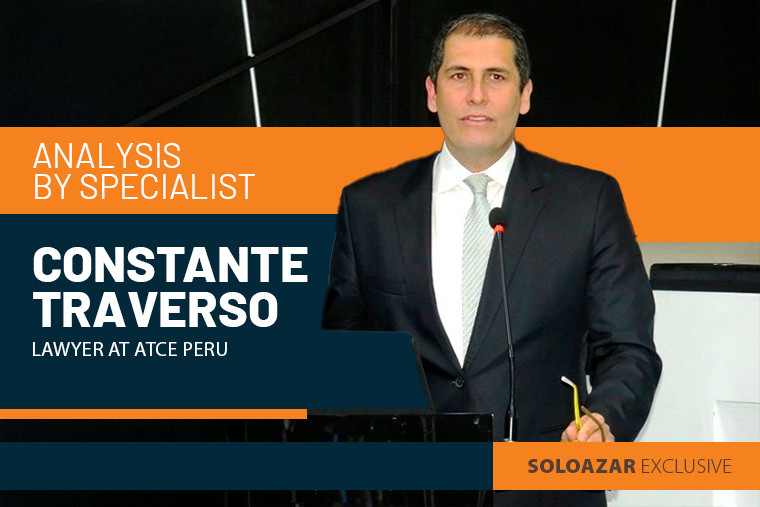Gaming in Peru
Tuesday 17 de June 2025 / 12:00
2 minutos de lectura
Peru has a strong gambling tradition and modern regulation that has allowed the formal development of the industry, generating significant employment and investment. However, in recent years, the creation of new poorly designed taxes has negatively affected the sustainability of the sector, discouraging investment and encouraging illegal gambling. Constante Traverso, lawyer at ATCE Peru, an association that promotes a legislative correction to guarantee a fair, technical and constitutional tax regime to allow the consolidation of the industry, performs an analysis exclusively for SoloAzar.

Peru has a long gambling tradition. The operation of lotteries dates back to the Viceroyalty, horse betting has been in operation for more than a century and maintains an important presence through the Jockey Club of Peru, bingos and casinos had a great growth in the nineties and finally remote gambling maintains a great expectation since its recent regulation.
From a constitutional point of view, Peru is an unbeatable destination for private investment, as it offers national and international operators equal treatment, freedom of exchange, freedom of remittances abroad, freedom to hold and dispose of foreign currency, free access to the market and business, and a solid constitutional tax regime, characterised by the Principle of Non-Confiscation.
In this sense, in recent years, the Gaming Industry has achieved a great development, with special regulation for Casino Tables, Slot Machines, Remote Gambling and Sports Betting, maintaining international standards and sufficient guarantees for investment.
The adequate regulation, together with the consolidation of a highly professional and qualified team in the regulator's office, with wide experience and knowledge, which day by day give evident signs of excellence, have allowed, for example, that in the period 2009 - 2019, before the pandemic, not only a formal and orderly gaming market is generated, with no illegal gaming; but more importantly, the gaming industry has achieved the generation of more than 250,000 direct jobs, the contribution in special taxes for an amount greater than one billion dollars and a considerable private investment.
Notwithstanding the above, the approval of a Public Policy on Gambling remains a pending task to achieve the consolidation of the industry. Although it is true that we have an advanced regulation, the gaming tax regime has been the subject of several controversies, excesses and political decisions that have been affecting us in a very negative way.
Let us remember that the Peruvian market is an open market and therefore very competitive. In this sense, after the ruling of the Constitutional Court in 2002 on the Gaming Tax, which declared the 20% rate on the Gross Gaming Revenue - GGR - confiscatory, a rate of 12% was established, which provided stability and allowed for a great development and growth of the industry.
Unfortunately, in the last five years, the Peruvian Executive Power has created new taxes, this time very questionable, not only due to their economic impact, but also due to their bad legislative technique, by trying to affect, for example, the operation of Casino Games and Slot Machines with ‘blind’ taxes, that is to say that they affect the operation alone, regardless of the results obtained; and taxes on the wager in the case of remote games, which considering the high rates of payment of prizes, are unfeasible.
We consider that after more than 25 years of special regulation of gambling in Peru, there is a consensus that this activity should be affected with special taxes, mainly because it demands greater efforts from the State in the supervision, control and actions to deal with the externalities inherent to the activity, however, this affectation should take place within the constitutional and legal framework, allowing the activity to be sustainable and viable, otherwise it ends up encouraging illegal gambling.
From the official figures for the collection of the Gambling Tax for 2023 and 2024, which affects the operation of Casino Games and Slot Machines, we can conclude that the levels of revenue obtained prior to the pandemic have not been recovered, remaining at 60% of those registered in 2019. Added to this difficult situation is the creation of the new tax called Selective Consumption Tax - ISC, which has been increasing year by year, as it is indexed to a legal value, currently constituting the sum of both taxes at a rate higher than 18% of the GGR. This situation not only makes the current tax rate confiscatory, but also discourages investment and significantly affects employment.
A similar case is the one we are experiencing with Sports Betting and Remote Betting, where after arduous work to achieve a technical regulation with international standards and after the excellent work of the regulator to conduct the process of approvals and licences, the creation of an additional tax, called the Selective Consumption Tax - ISC, has considerably affected this activity, mainly due to its anti-technical design to affect gambling, without considering that given the high percentages of prize payments, the combination of the Gambling Tax and the new ISC constitutes an impact of more than 45% of the GGR, a tax that makes the activity unviable and encourages illegal gambling.
From ATCE PERU we have been working to achieve a legislative correction, we are sure that we will soon achieve the objectives we have set, always seeking, within the framework of respect for the Constitution and the Law, a correct regulation of gambling.
*Constante Traverso is a lawyer specialising in the gaming industry, who currently represents ATCE PERU, the Association of Entertainment Technicians and Consultants of Peru.
Relive PERU GAMING SHOW 2025 experience with SoloAzar's social media coverage and exclusive interviews.
Follow us on LinkedIn and Instagram to stay in the loop!
Categoría:Analysis
Tags: Sin tags
País: Peru
Región: South America
Event
iGaming Club Conference Cancun
24 de November 2025
Levon Nikoghosyan Confirms iGaming Cancun’s Success and Future LATAM Expansion
(Cancun, SoloAzar Exclusive).- The vibrant energy of iGaming Cancun has set the tone for a new chapter in the Latin American iGaming industry. Levon Nikoghosyan, CEO and Co-Founder of AffPapa and iGaming Club, shared his enthusiasm for the event’s debut in Mexico, highlighting its impact on the regional market and the company’s ambitious plans for the future.
Thursday 04 Dec 2025 / 12:00
iGaming Club Cancún 2025 Concludes Successfully with Strong Connections in Its First LatAm Edition
(Cancun, SoloAzar Exclusive).- iGaming Club Cancún 2025 came to a close last night with a comprehensive experience of conferences, networking, and the AffPapa iGaming Awards LATAM gala, consolidating itself as a unique space for operators, affiliates, and providers in the region.
Thursday 27 Nov 2025 / 12:00
iGaming Club Cancún 2025: Affiliates, Operators, and Innovation Take Center Stage on Final Day
(Cancun, SoloAzar Exclusive).- The second and final day of iGaming Club Cancún 2025 unfolds today, bringing together operators, affiliates, and select B2B providers in a unique networking and conference environment that highlights the evolving dynamics of the Latin American iGaming market.
Wednesday 26 Nov 2025 / 12:00
SUSCRIBIRSE
Para suscribirse a nuestro newsletter, complete sus datos
Reciba todo el contenido más reciente en su correo electrónico varias veces al mes.




















